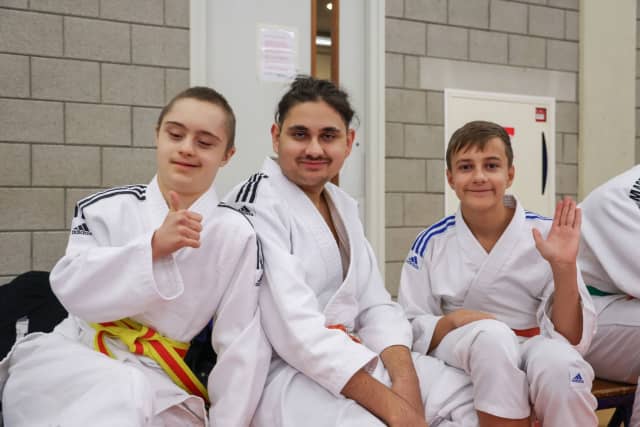Before the competition, the EJU Get Together programme began with the divisioning workshop, where participants were observed to ensure they were placed into the right division. The procedure is necessary to ensure the safety of all, whilst giving an opportunity to everyone to showcase their ability to practise judo.
The workshop was led by Sport Director of the Virtus and Leader of Adaptive Judo at the British Judo Association Kerry Tansey who explained, “First of all, without you [coaches], this would not be possible, so we really appreciate everyone taking the time to come here today. The way we do the divisoning is based on athlete’s abilities, not their disabilities, so all coaches can watch everybody else to make sure that judoka are fairly assessed on their judo ability.”
The expertise and knowledge of the coaches, medical professionals and technical competition organisers was joined to ensure the levels were appropriate for the well-being of the athletes.
The functional classification system consists of 5 levels and classifies judoka based on insight, power, speed, will to win and judo capability. The following criteria are also taken into account: judo skills, weight, gender and age.
EJU Vice-President and head of the education sector, Sergei Aschwanden, said during the opening of the event, “We welcome you all to this first EJU Get Together event. For us, this is a very important event to see how we can work together and how we can develop, to do even better in the coming years. We have almost 300 competitors from 25 countries on site; this is fantastic. We are also grateful for our doctors for their input.”
Head of the IJF Medical Commission, Dr Antonio Castro, said, “It is very important for us to be part of the coaching and refereeing meetings, to understand the rules and to see how, from a medical point of view, we can help, creating something new together. The most important part is that we are here to help to create a new system, a new structure together for the future. It is so significant that we come together from the beginning and I can speak for all of us when I say it is certainly an honour to be here and be part of this new creation.”
EJU and IJF Medical Commissioner Dr Arnold Brons added, “First of all, it is kind of like a birth of a baby for us. On a more serious note, there are judo rules and medical rules. Here, the judo rules are adapted accordingly but the medical rules stay the same and are applied to fit the conditions. Our work is to establish different categories, together with the coaches and referees, which we can implement in the tournament.”
More information on https://www.eju.net/




